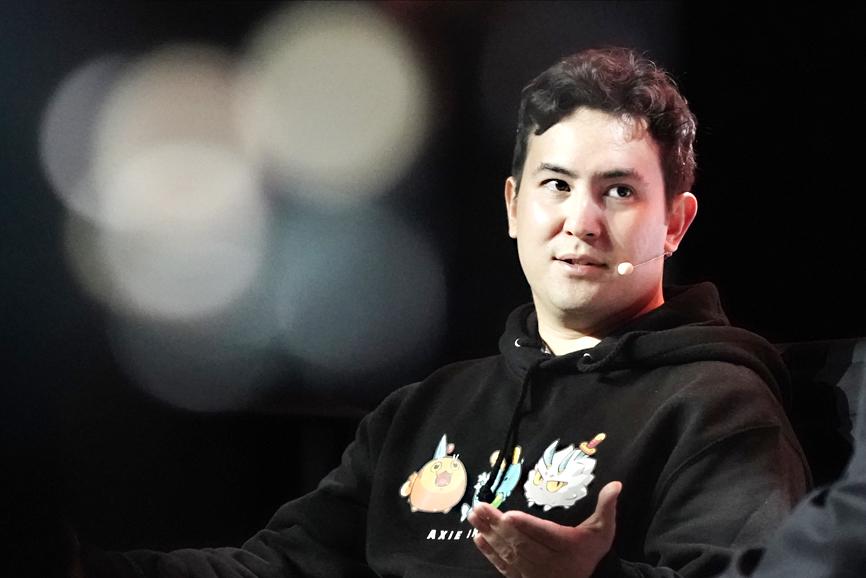Jarindr Thitadilaka said he made as much as US$2,000 a month last year from his collection of digital pets, which he would breed and send into battle to win cryptocurrency.
The 28-year-old from Bangkok was playing Axie Infinity, one of a new breed of blockchain-based online games dubbed “play-to-earn,” which blend entertainment with financial speculation.
These games can make for lucrative businesses amid the hype around non-fungible tokens (NFTs) and virtual worlds, attracting millions of players plus billions of dollars from investors who see the games as a way to introduce more people to cryptocurrency.

Photo: Bloomberg
In Axie Infinity, users buy virtual blob-like creatures with varying attributes as NFTs, or non-fungible tokens — digital assets whose owner is recorded on the blockchain — for anything from tens of dollars to hundreds of thousands.
Players can then use the pets to earn money by winning battles, as well as creating new pets, whose value depends on their rarity. The assets can be traded with other players on the platform, which says it has about 1.5 million daily users.
“It’s not just a game anymore. It’s more like an ecosystem,” Thitadilaka said. “You can even call it a country, right?”

Photo: AFP
The dangers of this speculative ecosystem, and the largely unregulated crypto gaming industry, were brought into sudden focus last week when Axie Infinity was hit by a US$615 million heist. Hackers targeted a part of the system used to transfer cryptocurrency in and out of the game.
Axie Infinity’s Vietnam-based owner, Sky Mavis, said that it would reimburse the lost money through a combination of its own balance sheet funds and US$150 million raised by investors, including cryptocurrency exchange Binance and venture capital firm Andreessen Horowitz.
Sky Mavis cofounder Aleksander Larsen said that if he could do things differently, he would have focused more on security when growing the game, which was launched in 2018.
“We were running 100 miles per hour, basically, to even get to this point,” he said. “The trade-offs we made maybe weren’t the ideal ones.”
The hack, one of the biggest crypto heists ever, shone a light on play-to-earn games, a young world largely unknown outside crypto and gaming circles, that is becoming big business.
Players spent US$4.9 billion on NFTs in games last year, representing about 3 percent of the global gaming industry, market tracker DappRadar said.
Although demand has cooled since peaking in November last year, gaming NFTs have still racked up US$484 million in sales so far this year.
Investor interest in NFT-based games has also ballooned, with projects attracting US$4 billion of venture capital funding last year, up from US$80,000 in 2020, DappRadar said.
“There’s so many users who want to interact with the tech,” Larsen said, adding that Axie Infinity’s revenues exceeded US$1.3 billion last year.
“It’s like you found a new continent ... like finding America all over again,” Larsen said.
HAVES AND HAVE NOTS
Adding layers of complexity, unofficial financial networks have also emerged around these games, as some players leverage their coveted in-game possessions for further gain.
Thitadilaka wanted make more money than he could by simply playing on his own, so in July last year, he and his friends decided to form what is known a “guild.” They allowed their NFTs to be used by people who wanted to play Axie Infinity free of charge, without investing in an asset, and took a cut of any winnings in return.
This model is commonplace across play-to-earn games.
Thitadilaka said that his guild, GuildFi, grew into a network with 3,000 Axie Infinity players who split their earnings with the asset owners 50-50.
Thitadilaka now runs GuildFi as a full-time job, and the company has raised US$146 million from investors.
Southeast Asian countries such as Thailand and the Philippines have emerged as some of the hottest global gaming hubs.
Teriz Pia, who is 25 and lives in Manila, quit her job as a preschool teacher in June last year after her brother founded a play-to-earn gaming guild, Real Deal Guild.
Now she says she makes as much as US$20,000 a month through her network of more than 300 players across multiple games, plus other crypto assets.
For Axie Infinity, Pia lets her players keep 70 percent, while she takes a 30 percent cut. In another play-to-earn game, Pegaxy, where players buy and trade NFTs of virtual horses to compete in races to win crypto tokens, she splits it 60-40.
“I don’t call them workers. I just call them my friends or my scholars,” she said. “The salary in the Philippines if you’re a teacher ... I’m a college graduate, I’m an educator, but it’s not enough. I never imagined that I could earn this kind of money.”
However, Pia said that it is a dangerous business.
“There’s a lot of risk. When I’m investing in a new game ... being a member of Real Deal Guild, we have a partnership team, we have researchers, but at the end of the day, it’s still crypto, it’s still a risk,” she said.
One of the biggest play-to-earn guilds, Yield Guild Games, said it had 10,000 Axie Infinity players as of the fourth quarter of last year who kept 70 percent of their earnings and had received US$11.7 million in total.
Australian-based Corey Wilton, 25, founded Pegaxy, which he says has about 160,000 daily users.
He said that an estimated 95 percent of users of play-to-earn games participate as “renters,” generating revenue without owning the assets, while 5 percent are asset owners.
‘PEOPLE GET HURT’
Legal experts say there is no safety net for players who effectively invest in risky assets, leaving them highly vulnerable should a project fail or the market for the assets dry up.
As global regulators seek to get to grips with cryptocurrencies themselves, there is little oversight of NFTs or the relatively niche offshoot of play-to-earn games, which typically use in-game crypto tokens that can then be cashed out into traditional money.
“Storing any value in projects like this is risky. The earning in play to earn, blockchain-based games is often through rewards paid in the native token of the project,” said David Lee, cryptocurrency associate at London-based law firm Fladgate LLP.
“There are no guaranteed values of either the token or the in-game asset as their value is often determined by supply and demand in the market. This means there can be significant volatility in the price and, if the project becomes less popular or is abandoned, then there is a potential for the assets to become worthless,” Lee said.
Yet advocates of these games say success is built upon a combination of factors such as skill, strategy and luck.
“There is definitely money to be made, but there is also money to be lost here,” Wilton said. “Play to earn should not be confused with charity, that’s how people get hurt.”

The Eurovision Song Contest has seen a surge in punter interest at the bookmakers, becoming a major betting event, experts said ahead of last night’s giant glamfest in Basel. “Eurovision has quietly become one of the biggest betting events of the year,” said Tomi Huttunen, senior manager of the Online Computer Finland (OCS) betting and casino platform. Betting sites have long been used to gauge which way voters might be leaning ahead of the world’s biggest televised live music event. However, bookmakers highlight a huge increase in engagement in recent years — and this year in particular. “We’ve already passed 2023’s total activity and

Nvidia Corp CEO Jensen Huang (黃仁勳) today announced that his company has selected "Beitou Shilin" in Taipei for its new Taiwan office, called Nvidia Constellation, putting an end to months of speculation. Industry sources have said that the tech giant has been eyeing the Beitou Shilin Science Park as the site of its new overseas headquarters, and speculated that the new headquarters would be built on two plots of land designated as "T17" and "T18," which span 3.89 hectares in the park. "I think it's time for us to reveal one of the largest products we've ever built," Huang said near the

China yesterday announced anti-dumping duties as high as 74.9 percent on imports of polyoxymethylene (POM) copolymers, a type of engineering plastic, from Taiwan, the US, the EU and Japan. The Chinese Ministry of Commerce’s findings conclude a probe launched in May last year, shortly after the US sharply increased tariffs on Chinese electric vehicles, computer chips and other imports. POM copolymers can partially replace metals such as copper and zinc, and have various applications, including in auto parts, electronics and medical equipment, the Chinese ministry has said. In January, it said initial investigations had determined that dumping was taking place, and implemented preliminary

Intel Corp yesterday reinforced its determination to strengthen its partnerships with Taiwan’s ecosystem partners including original-electronic-manufacturing (OEM) companies such as Hon Hai Precision Industry Co (鴻海精密) and chipmaker United Microelectronics Corp (UMC, 聯電). “Tonight marks a new beginning. We renew our new partnership with Taiwan ecosystem,” Intel new chief executive officer Tan Lip-bu (陳立武) said at a dinner with representatives from the company’s local partners, celebrating the 40th anniversary of the US chip giant’s presence in Taiwan. Tan took the reins at Intel six weeks ago aiming to reform the chipmaker and revive its past glory. This is the first time Tan